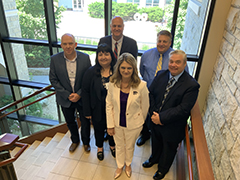June 20, 2019
Leaders from school districts across Kansas attend rural education summit at K-State

More than 70 teachers and administrators from more than 30 school districts across Kansas took part in the inaugural Rural Education Summit hosted by the Kansas State University College of Education's Rural Education Center.
The daylong event was June 13 on the university's campus and the schedule included keynote addresses from three of the nation's leading researchers in rural education and breakout sessions. Debbie Mercer, dean of the College of Education, and Randy Watson, Kansas commissioner of education, welcomed attendees. The event was organized by J. Spencer Clark, associate professor of curriculum and instruction and director of the Rural Education Center, and Lori Goodson, assistant professor of curriculum and instruction and center assistant director.
"Impact is an important word and concept in our college," Mercer said. "This summit marks a turning point for the center and its core mission, and we are excited for what this means for the future of education in our rural communities."
Teachers, administrators and education leaders from the following schools across Kansas attended the summit: Alma, Ashland, Axtell, Belle Plaine, Belleville, Bennington, Caney, Cedar Vale, Clay Center, Colony, Dighton, Fort Scott, Haviland, Hays, Herrington, Holton, Kiowa, LaCrosse, Liberal, Little River, Madison, Manhattan, Marion, Morehead, Ness City, Pleasanton, Pratt, Randolph, Rolla, Sedan, Seneca, Stafford, Tescott, Topeka and Westmoreland.
At the summit, Jerry Johnson, incoming chair of the educational leadership department at Kansas State University, identified four issues affecting rural areas, the most obvious being outmigration and viability and economics. Johnson said asking the right framing questions would be a determining factor.
"How do we marshal the assets and potential of rural schooling to promote both excellence and equity for students, families and communities?" he asked.
Allen Pratt, keynote presenter and executive director of the National Rural Education Association, said he travels around the country and was surprised by what he experienced during the summit.
"K-State is unlike any place I've been," Pratt said. "It's so positive here. There's already a dialogue occurring between the university and rural communities. They know you are legit, and you understand rural. Because of that, they trust you. People in other places are fighting to get to that point, and you're already there."
Hobart Harmon, keynote presenter and co-director of the Rural Math Excel Partnership grant at the Virginia Advanced Study Strategies and a leading expert public education innovation in rural America, echoed Pratt's observation.
"The center's role fits perfectly with the land-grant mission," Harmon said. "K-State is the perfect institution to create a model for how land-grants improve school systems and give young people more opportunities, but this requires a close relationship."
Pratt and Harmon believe drawing on existing relationships and enhancing the collaboration between Kansas State University and rural schools could be a game-changer for education in the state.
"I'm not certain the university and K-12 districts realize how powerful their unified voice could be for legislative purposes, for grant purpose and for changing the dynamics of education," Pratt said. "That collaborative process is powerful."
Harmon said the center's timing is remarkable.
"Rural America is much more visible to the average American now because of food insecurity, safety issues in schools and poverty," he said. "Technology is critical because with high-speed internet access, people can work in kind of urban opportunity but live in a rural community. Entrepreneurialism and job creation are part of revitalizing rural America. It's how we tap the resources of creativity in people and partner with people inside and outside of rural America to revitalize economies and create opportunities for future generations."
Clark said he was pleased with the event
"It was a productive day," Clark said. "We had an awesome group of educators who were engaged in the sessions, anxious to collaborate, and ready to be catalysts for innovation in their communities. I think we started discussions at the summit that will have lasting impacts on rural schools in Kansas."
